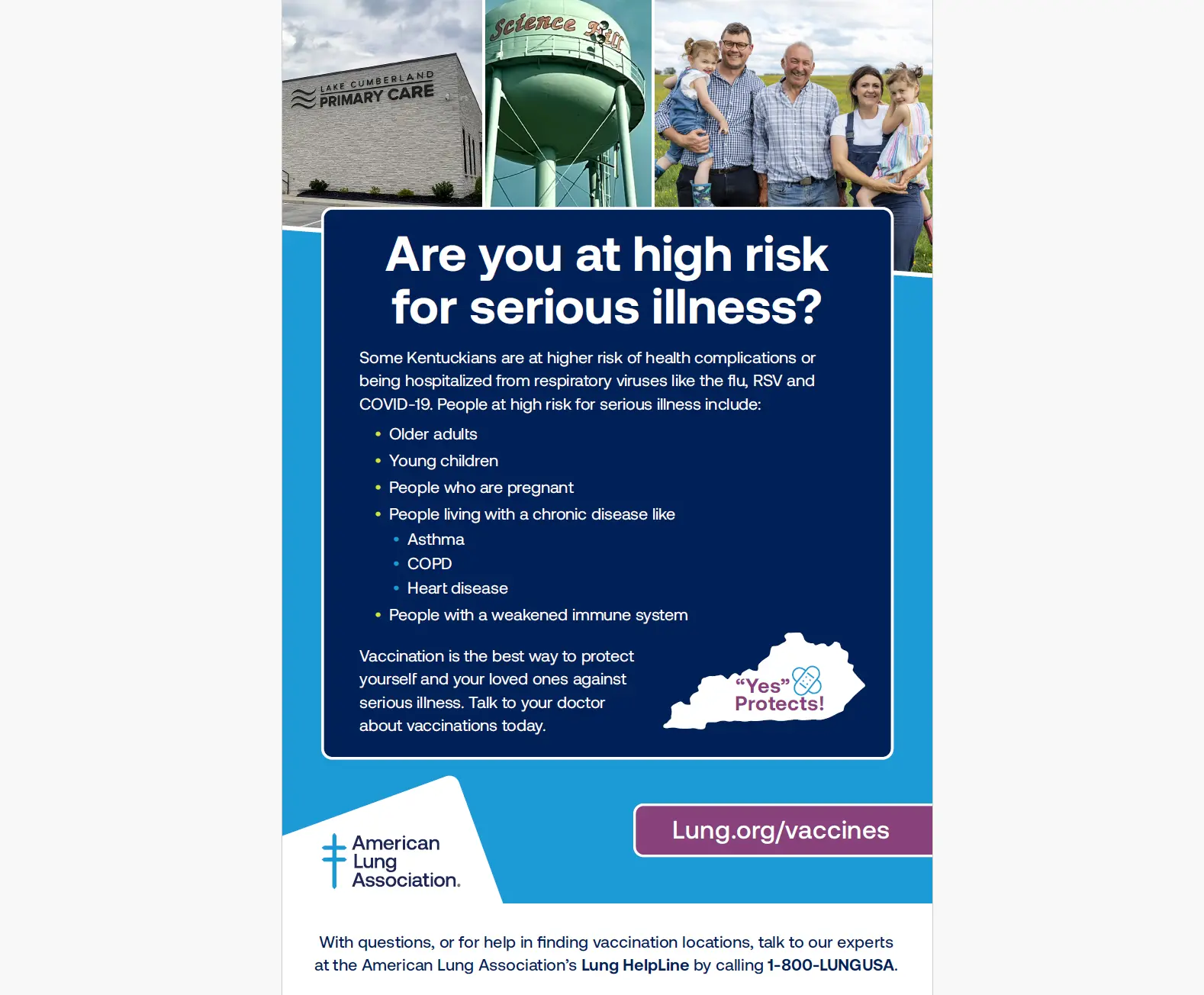Increasing Vaccine Confidence in Rural Communities of South-Central Kentucky
Resources for community leaders and healthcare professionals to increase vaccine confidence and provide infectious respiratory disease education in rural communities of south-central Kentucky.Rural Health & Infectious Respiratory Disease
Living in a rural community brings many benefits—access to nature, privacy, a strong sense of community, and more. However, rural communities often experience a higher burden from many diseases, including chronic lung disease, like COPD, and cancer. Adults having one or more of these medical conditions are at increased risk for severe illness, complications, hospitalization and death from respiratory viruses like the flu, COVID-19 and RSV. Rural communities are also less likely to receive recommended vaccinations to help protect themselves and their families from serious illness1.
The information and resources on this webpage are designed to help community leaders have meaningful conversations with rural community members about the importance of vaccinations.
Addressing Health Equity
The Office of Disease Prevention and Health Promotion’s Healthy People 2030 initiative is the nation’s 10-year plan for addressing critical public health priorities. One of Healthy People 2030’s overarching goals is to “eliminate health disparities, achieve health equity, and attain health literacy to improve the health and well-being of all.” Learn more about how Healthy People 2030 plans to achieve health equity.
Health equity is the opportunity for everyone to reach their full health potential, regardless of their social, economic or environmental circumstances.
A health disparity is a type of health difference that is closely linked with social, economic, or environmental disadvantages. Health disparities affect populations who have systematically experienced greater obstacles to their health, such as rural communities. Rural communities experience several health disparities compared to their urban counterparts such as higher rates of chronic illness and lower vaccination rates. This is due to numerous factors including limited access to healthcare and physician shortages.
Vaccine Confidence and Rural Kentucky
Vaccine confidence is the belief that vaccines work, are safe and are part of a trustworthy medical system. The decision to get vaccinated is influenced by many factors including cultural, social, individual, community, political and other factors.
Vaccination data in the state of Kentucky show that:
What are factors contributing to lower vaccine confidence in Kentucky?
- Circulation of vaccine mis- and disinformation
- Lack of credible information
- Low health literacy
- Social determinants of health that serve as barriers to vaccinations such as lack of transportation and healthcare coverage
Community Leaders as Trusted Messengers
Healthcare organizations and community leaders play a crucial role as trusted messengers for rural community members.
Getting to “Yes” for Routine Vaccines – Toolkit for Community Leaders
The American Lung Association has partnered with the Kentucky Rural Health Association and Immunization Coalition of Kentucky to develop a vaccination education toolkit Getting to "Yes" for Routine Vaccines to support community leaders and healthcare professionals address vaccine hesitancy and increase vaccine confidence in rural communities of south-central Kentucky.
Toolkit for Community Leaders
The Lung Association conducted a needs assessment with community organizations that serve south-central Kentucky to gain feedback on beliefs, knowledge, gaps in education and barriers to care that influence rural community members’ decision to get vaccinated. The responses from this needs assessment informed the creation of the Getting to “Yes” for Routine Vaccines toolkit which is specifically tailored for rural communities in south-central Kentucky and includes:
- Infectious respiratory disease education
- Effective communication strategies
- Motivators in getting vaccinated
- Personal story from a local healthcare professional
- Tips for addressing barriers to care
- Educational resources
Educational Resources
Download, save or print the resources included within the Getting to "Yes" for Routine Vaccines toolkit for use within the community.
American Lung Association Resources
Anyone can get sick with an infectious respiratory disease, but individuals with certain underlying medical conditions or risk factors are at higher risk for serious illness. Some infectious respiratory diseases can cause long-term illness, existing chronic health conditions to worsen, hospitalization and death. Learn more about three common vaccine-preventable diseases:
Additional links and resources:
Vaccination Disparities Among Hispanic/Latino Communities in Kentucky
Additional health disparities exist within rural populations of Kentucky. In 2022, only 38.7% of Hispanic/Latino adults living in Kentucky received a flu vaccine in the past 12 months compared to 44.7% of white adults5. The Lung Association has educational materials available in Spanish:
Page last updated: January 15, 2026









